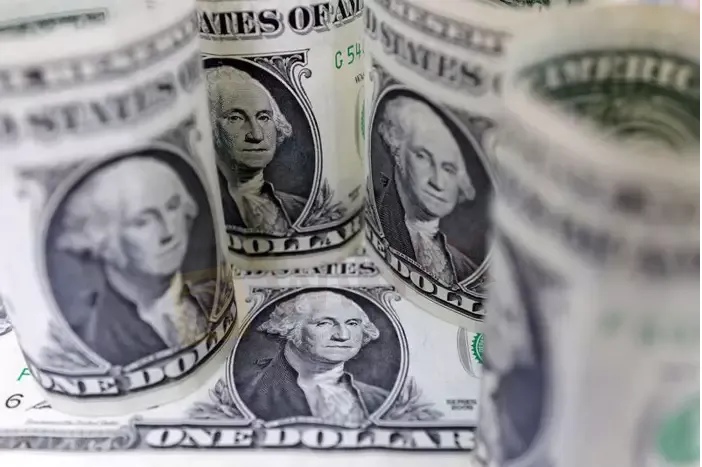简体中文
繁體中文
English
Pусский
日本語
ภาษาไทย
Tiếng Việt
Bahasa Indonesia
Español
हिन्दी
Filippiiniläinen
Français
Deutsch
Português
Türkçe
한국어
العربية
Dollar extends gains against yen as big Fed hike bets ramp up
Abstract:The dollar extended it best rally against the yen since mid-June on Monday, buoyed by higher Treasury yields after blockbuster U.S. jobs data lifted expectations for more aggressive Federal Reserve policy tightening.

The dollar extended it best rally against the yen since mid-June on Monday, buoyed by higher Treasury yields after blockbuster U.S. jobs data lifted expectations for more aggressive Federal Reserve policy tightening.
The greenback was last 0.31% higher at 135.42 yen, and earlier rose to 135.585 yen, its highest since July 28, after surging 1.57% in the previous session, its biggest single-day gain since June 17.
The dollar index, which measures the currency against six counterparts, stood at 106.77, from a Friday peak of 106.93, also the strongest since July 28.
Traders currently see a 73.5% probability the Fed continues the pace of 75 basis-point interest-rate increases for its next policy decision on Sept. 21, from about 41% before surprisingly strong payrolls data on Friday raised worries that wage growth would fuel inflationary pressures.
The focus this week will be on the U.S. consumer price index due Wednesday, and whether it can cement the odds for super-sized rate rises. Analysts polled by Reuters expect annual inflation eased to 8.7% in July from 9.1% previously.
“It will likely take a number below 8.4% to get the odds of a 50bp hike in September as the default setting,” although that “seems unlikely,” Chris Weston, head of research at Pepperstone, wrote in a note.
“I wouldnt want to be short USDs if the CPI print comes in above 9%.”
The two-year Treasury yield remained elevated at 3.2628% in Tokyo trading on Monday, after reaching 3.3310% at the end of last week, a level not seen since mid-June.
The 10-year yield stood at 2.8470%, sticking close to the two-week high of 2.8690% touched Friday.
The negative spread between the two- and 10-year yields was 42 basis points, having hit 45 basis points on Friday, the most since August 2000. An inverted yield curve is widely interpreted as a pre-cursor to a recession.
Elsewhere, the euro sank 0.35% to $1.01595 while sterling slid 0.19% to $1.2050.
The British pound dropped as low as $1.2004 on Friday, a day after the Bank of England raises interest rates by an as-expected half a point at the same time as warning of a protracted downturn.
“The Bank of Englands forecast of recession underpins the vulnerability of the pound going forward,” Rabobank senior FX strategist Jane Foley wrote in a note, predicting sterling could dip to $1.14 within three months.
Meanwhile, the Australian dollar slipped 0.06% to $0.6907, while the New Zealand dollar fell 0.19% to $0.62315.

Disclaimer:
The views in this article only represent the author's personal views, and do not constitute investment advice on this platform. This platform does not guarantee the accuracy, completeness and timeliness of the information in the article, and will not be liable for any loss caused by the use of or reliance on the information in the article.
Read more

The Hidden Checklist: Five Unconventional Steps to Vet Your Broker
Forex broker scams continue to evolve, employing new tactics to appear credible and mislead unsuspecting traders. Identifying these fraudulent schemes requires vigilance and strategies beyond the usual advice. Here are five effective methods to help traders assess the legitimacy of a forex broker and avoid potential pitfalls.

Doo Financial Obtains Licenses in BVI and Cayman Islands
Doo Financial, a subsidiary of Singapore-based Doo Group, has expanded its regulatory footprint by securing new offshore licenses from the British Virgin Islands Financial Services Commission (BVI FSC) and the Cayman Islands Monetary Authority (CIMA).

CFI’s New Initiative Aims to Promote Transparency in Trading
A new programme has been launched by CFI to address the growing need for transparency and awareness in online trading. Named “Trading Transparency+: Empowering Awareness and Clarity in Trading,” the initiative seeks to combat misinformation and equip individuals with resources to evaluate whether trading aligns with their financial goals and circumstances.

Malaysian-Thai Fraud Syndicate Dismantled, Millions in Losses Reported
The Royal Malaysia Police (PDRM) has received 26 reports concerning the Nicshare and CommonApps investment schemes, both linked to a major fraudulent syndicate led by a Malaysian citizen. The syndicate’s activities came to light following the arrest of its leader by Thai authorities on 16 December.
WikiFX Broker
Latest News
ASIC Sues Binance Australia Derivatives for Misclassifying Retail Clients
WikiFX Review: Is FxPro Reliable?
Malaysian-Thai Fraud Syndicate Dismantled, Millions in Losses Reported
Trading frauds topped the list of scams in India- Report Reveals
AIMS Broker Review
The Hidden Checklist: Five Unconventional Steps to Vet Your Broker
YAMARKETS' Jingle Bells Christmas Offer!
WikiFX Review: Something You Need to Know About Markets4you
Revolut Leads UK Neobanks in the Digital Banking Revolution
Fusion Markets: Safe Choice or Scam to Avoid?
Currency Calculator


